Conflict Global Storm
Because Terror is a sensitive issue.
It's comforting to be able to predict things at this time of year. Like the crispness of the air when summer gives way to autumn, the incredulous looks you get by growing a beard, or the number of smug new ways for PES fans to belittle the latest FIFA despite having no intention of playing it for more than 30 seconds. But other things that we have an uncanny knack of being able to foresee we gain absolutely no joy from, such as Norwich's depressing defeat to Reading on Saturday, the lack of sleep from impending parenthood [I'm not convinced that one falls under the royal 'we', boss - Tom] or the September arrival of a Conflict game that doesn't live up to its potential (and then goes in with a bullet at number one).
But this time we were almost certain Pivotal was really listening to the fans, and determined to release a game that does the series justice. All the talk of dynamic, reactive AI seemed to be more than idle pre-release hype; seeing it being demonstrated certainly gave us hope, and we felt that solving this particular foible would wipe out most of the game's issues at a stroke.
Yet, for the fourth version running, Conflict's gameplay remains much the same, with enemies all-too happy to charge at you like a suicide bomber playing tag, but more of that in a minute.
Conflict Clancy Storm
With no specific war hook to hang the latest Conflict on, Pivotal has gone down the long dark road of generic Tom Clancy-esque counter-terrorism game scenarios for inspiration. In this case we're dealing with a bunch of neo nazi extremists, hell-bent on bringing a new world order - or one that generally involves capturing high-ranking politicians, possessing more firearms than the army, and a headcount that's as impressive as it is incredible.
Unlike the sort of counter-terrorist operations we see on, say, 24, where one sweaty man and his mates down the pub cause all manner of world-threatening craziness, the March 33 mob in Conflict Global Storm number in their thousands. In one of CGS's 14 missions you'll often encounter in excess of 150 enemies in the 30-45 minutes it usually takes to inch your way through the chaos. Even at a conservative estimate, that's about three enemy encounters per minute, although it's usually much more than that - it's the old calm-before-the-(conflict global) storm syndrome.
As ever (and typical for his genre to be fair), each new part of every new location brings about an intense fire fight, where you must take down at least a couple of waves of enemies holed up in a room/bunker/underground base (delete as appropriate). Sometimes it's more than a couple of waves. Sometimes it seems to go on for three, maybe four waves, when just as it seems safe to proceed a bunch of stragglers will basically spawn from nowhere and charge like suicidal lemmings in your direction.
Conflict Groundhog Storm
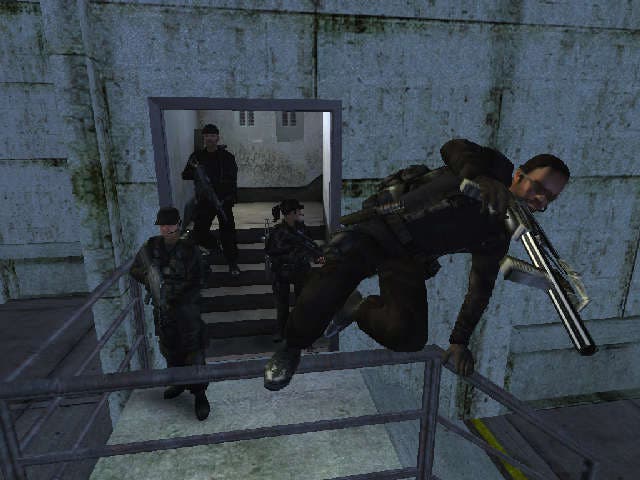
But the relentless assault isn't really the issue here. Bungie famously summed up Halo as 30 seconds of fun over and over, because it got the core gameplay mechanics - the fire-fights - so spot on. Where Conflict falls down is the undeniable fact that the shoot-outs just aren't that much fun; it's literally 30 seconds of deranged encounters over and over. Despite all the confident boasts, it's the enemy AI that detracts from the enjoyment. Although some of them appear to want to duck between cover points, don't be fooled. When the 400th enemy has charged maniacally in your direction instead of outflanking you or simply trying to stay behind cover you won't be raving about great AI. You'll be sighing deeply that you're experiencing the same old issues all over again.
For us to suspend our disbelief, for us to really immerse ourselves in the action unfolding before us, we have to believe in the enemy. We have to feel that they want to kill us, don't want to die, and will work together as a team. The problem, in essence, is that you get the feeling the enemies in CGS couldn't care less about dying. Pivotal simply wants to create a crazy action experience by burdening the player down with the weight of numbers, because that's the only thing that really presents a challenge. And it's not just the sheer number of enemies at one time, but the amount dished out over a period of time. By repopulating cleared areas with wave after wave of similarly clueless goons you're forced to curse some desperately annoying game design, and endure severe padding. Pivotal would be smart to realise that less is more sometimes, especially if the enemy you're fighting is cunning. We'd much prefer to fight 30 intelligent enemies over a level than 150 complete idiots any day.
In other areas, though, Pivotal deserves much credit. Take the controls, for example. The existing set-up was arguably one of the finest examples of how to pack an enormous number of commands onto a joypad without ever confusing the player, and the refined version on offer here manages to go even further. That it does so without losing the intuitive design is remarkable, with some genuinely useful context-sensitive commands now possible. For example, the game predicts what you want to do whenever you walk up to something interesting, so any actions, such as picking up weaponry, opening doors, mounting an emplacement or getting into a vehicle are all context sensitive. Another nice touch is the ability to lob grenades directly where you want them to go - something that's enormously helpful in the heat of combat.
Healthy lifestyle
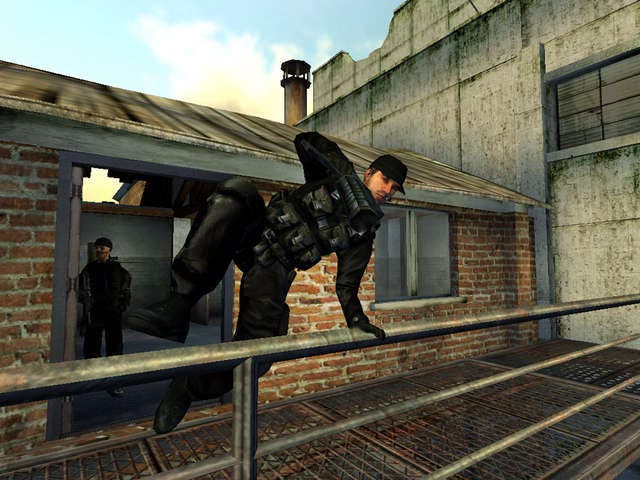
Other issues have been fixed too. In past Conflict games, healing yourself or one of your squad-mates was always a bit of a pain; especially given that once you'd selected the health pack it then became your 'weapon', meaning precious seconds were lost on the battlefield as you frantically scrolled back up your inventory to re-select the gun. Annoying. For Pivotal to automatically switch you back to the gun after healing is certainly a bonus, as is being able to point your reticule down at an injured team mate and command someone else to do the job.
Another faintly ludicrous part of the old Conflict design was not being able to pick up enemy weapons, despite the fact that you might be out of ammo. That's all changed now, though, and much of the time you'll be ransacking corpses for leftovers like you would in most other games of this nature. Oddly, some downed enemies still leave nothing behind, which suggests some sort of weapon economy system on Pivotal's part. It's also probably just as well that most corpses disappear, otherwise certain choke points on the map would literally be piled up with bodies - and we don't want to draw attention to how stupid that spectacle would look, now would we? Not to mention how wrong.
Some other assorted control improvements are genuinely useful, with the ability to play the game in first person now just a button click away (although the reticule is too wobbly and the recoil too loose to use properly until your characters move up through the ranks). Elsewhere you can now delay orders to the rest of the team, as well as using a more stealthy approach. But as useful as these undoubtedly could be, you're rarely motivated to use such tactics when the game's rush 'n attack style makes for such a frantic experience. To distil the problem into a bite-sized chunk, the excellent controls need a game that really makes use of them. At some point Pivotal will, but it hasn't managed it with this.
Lagging behind
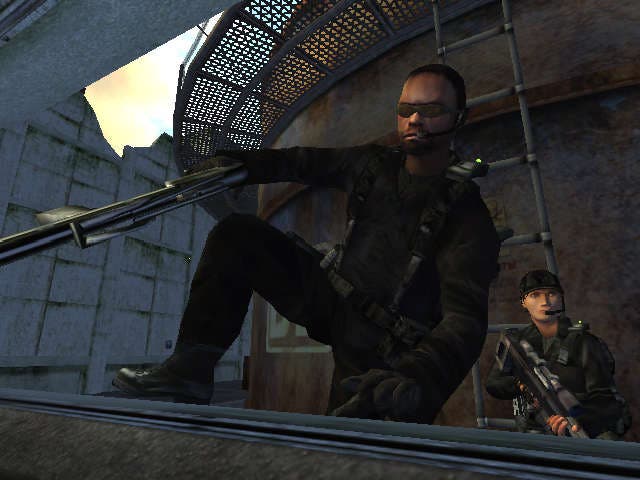
Pivotal does appear to be making decent inroads into improving the overall production values, though - an area the Conflict series has always lagged behind next to its competitors. The most obvious example of this is the distinctly overhauled graphics engine, which at times goes much further than ever in displaying a rich and detailed world. Previous draw distance and texturing issues have at long last been eradicated, with environments that are easily the most varied and accomplished seen in the series to date. Encompassing multiple countries and a good mix of indoor and outdoor settings, it keeps things fresh while sticking doggedly to the linear, funnelled level design that all Conflict games favour.
The character models sport much smoother animations as well, not to mention a much greater degree of detail, yet the spectacle still fails to truly convince as much as it should. That Pivotal is still struggling to get anywhere near the three-year-old Splinter Cell in terms of lighting and overall aesthetics is telling, and if you were hoping for us to mention a greater degree of interactivity with the environment, forget it. Even barrels don't explode, although we should perhaps give credit where it's due and note the ragdoll death animations and the ability to shatter windows. Even small victories are victories.
The cut-scenes and overall emphasis on the narrative has been improved greatly, though, with Bradley, Jones, Connors and Foley (and new sniper recruit Carrie Sherman) being brought to life with little inter-level exchanges. Sadly, they're about as memorable as characters as the kind of generic cardboard cut-out fodder we've snoozed through for years in the Tom Clancy games, so it's worth tempering our praise with a hefty dose of reality. It's not terrible or anything; just very very average.
Overruled
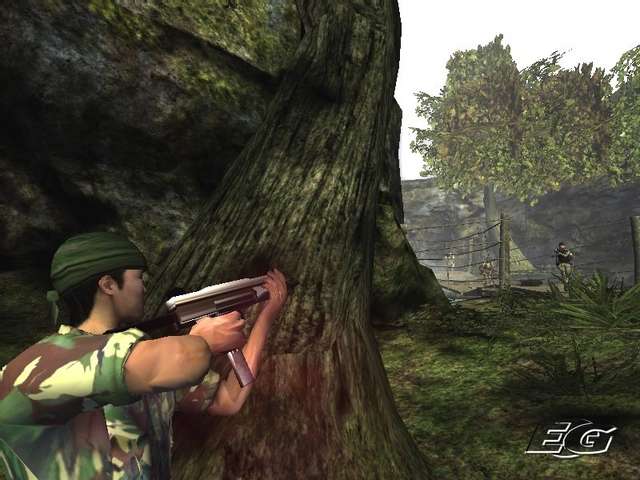
After griping about the AI and nodding sagely about the controls, is it really that bad a game? Well, no. If you stop and accept the game for what it is, and play by its rules, as opposed to the rules you think it should have, then it's another Conflict game you can chip away at over 10/12 hours and feel fairly satisfied. The limited save mechanic, we feel, strikes the right balance between being able to save anywhere, and forcing you to be a disciplined player. As a consequence, it does heighten the tension of creeping into uncharted territory, and probably makes it a much more compelling game than the procession it would turn into if you could simply save anywhere, as often as you like.
If we were feeling extra generous, we'd forgive some of the issues we have with the game and call it 'solid, dumb blasting fun', or something like that. Yes, it can be fun on occasion when you and your squad are all working together and taking down the kamikaze lunatics rushing at you from all sides, but it can also get very tedious when you've slogged like mad to defeat 20-odd goons, only to take a few steps forward and face a whole new posse that's triggered to arrive as soon as you cross some invisible line. It's also tedious when your squad-mates repeatedly do stupid things like wading directly into enemy fire, or complain they're out of ammo when there's an AK lying right next to them. Also, unlike the Red Storm games, your squad is still hopeless at finding decent cover points. Although it's nice to have direct control over all four squad members, you do wish the Conflict games would pinch some of the good ideas from its rivals.
Until now we've not mentioned the other modes, and perhaps the most exciting new addition is online co-op, allowing up to four players to enjoy any of the single-player campaigns - something the Red Storm games have done for years, we ought to point out. Without question, the best way to play any squad game is with friends, and needless to say Conflict is no exception, removing all of the slightly bothersome squad hand-holding that comes with all games of this nature. A word of warning, though: make sure you play the game with people who know what they're doing, and who want to work as a team, as it's crushing to play with the sort of players who think it's fun to stray into enemy fire. And it's also worth mentioning that the enemy AI is still just as mental, so the game doesn't really improve on that level.
Split the difference
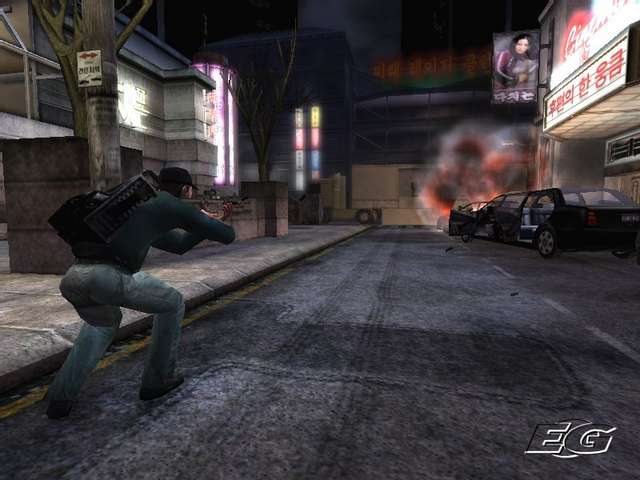
You can also continue a single-player game in split-screen mode, which is a particularly nice touch for those of you without Xbox Live. Online or System Link players can engage in a couple of minor variations such as Survival, or Missing In Action which essentially work on the basis of different health revival rules, but provide a decent, if undernourished multiplayer offering.
Inevitably we have to fumble for a score for all of this down the back of the Eurogamer sofa. Next to the recent Rainbow Six release, it's certainly far less buggy, but has enough issues all of its own to leave us with the same impression of it being essentially an underwhelming addition to the series. Is it better than previous Conflict titles? In many senses, yes. Technically it's a far more polished offering, and it goes even further in terms of giving players one of the most intuitive and flexible control systems around. But as many positive additions and improvements as there are, the core part of the game - the combat - still lags behind the competition to an alarming degree. Until Pivotal finally delivers a game where the enemies don't run at you like angry suicidal goats, and teaches your squad-mates to find proper cover it's never going to be worth more than the 6/10 score we slap on it every single year. Now, that wasn't comfortably predictable, was it?








